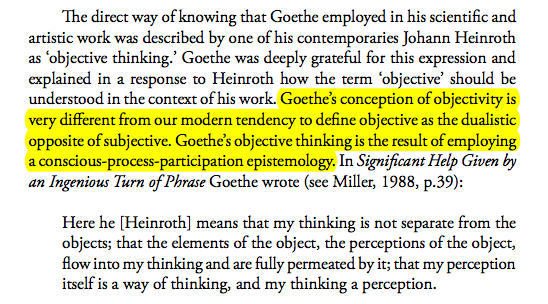Sometimes, we increase our understanding by introducing distinctions. If you look at a lump and can’t figure out its structure, you might make a distinction, and notice that the lump is a composite of two distinct things, and suddenly you understand its structure much better. We do this all the time, as when we identify two kinds of diabetes, with similar symptoms (the lump) but distinct etiologies (juvenile and acquired). Or when we learn the name of a new flower.
At other times, we learn by reconciling apparently distinct things. In this case, we see two entities turning out to be but different images of the same underlying structure. We do this often also, as when reading a story, the plot falls into place and you can reconcile previously incongruous sub-plots, or when we recognize the mother in the child.
Should we consider these to be distinct enterprises? Is the first Science and the second Religion? Hardly. Yet the knowledge offered by the contemplative traditions seems to be that obtained by following the second course exclusively, while the first is a caricature of purely reductionistic science.
But I think in bringing experience under the fold of collective inquiry, or in finding ways of discussing experience that, at least, do not offend scientists too much, we are making progress in the second way, and science, or our common stock of understanding, improves as a result. Here are some that merit our attention:
In talking about minds, we habitually use the terms “inner” and “outer”. This is a strange linguistic habit, and we should be taken somewhat aback if asked about the spatial referents of these terms. There are none, although convention locates the “inner” space within the head. However, if we look inside, we see only brains. Unifying these two is a huge hurdle, and possibly one of the resolutions of opposites that may be said to accompany enlightenment. The extended mind thesis testifies to the possibility of unifying the language in which we discuss these two, though it stops short of recognizing that they are not distinct realms, going for the cheap gag of making you imagine your mind somehow leaking out into the world.
Another pair that admit of unification is rather surprising: perception and action are not separate things. We have been thinking of them as input and output to something, and have identified with the middle bit, and called it mind. However, the cellular example (described elsewhere) perfectly illustrates the relation between perception and action, whereby we can see that they are co-determining, and not in a relation as cause and effect. This is true for a single cell, and it is true for humans. We can see the direct relationship only sometimes: the swaying room in which the optic flow at the retina allows the coupling of room and torso motion nicely illustrates the coupling between perception and action which is so tight that they become indistinguishable. Nervous systems mediate this relationship, making it harder for us to see, but the lawfulness of the relation still obtains. The mediation is what ultimately gives rise to phenomenal worlds. So if perception/action are unified, that places us in a bit of a bind. It presents with the puzzle of interpreting present experience, which now seems to be deterministic or at least sufficiently lawful that it will not support our notions of volition and agency. If the perception/action relation is invertible, present experience does not consist of cause and effect.
One way out of this bind is to recognize the P-world as distinct from the self. The P-world is present experience, and in recognizing it, we can learn to overcome several dualities. In present experience, the P-world, the subject/object divide is no more. There is no distinction between the perciever and the percept. Attention/Salience is another dualism that is hereby overcome. Salience is the “outer” form of attention. Attention the “inner” form of salience. Damasio does this nicely in his work when he distinguishes between emotion and feeling (if I am correct here, I need to check), one of which is the phenomenological concept, the other the observable counterpart.

